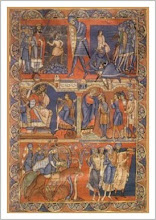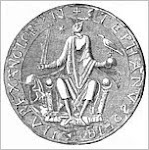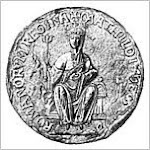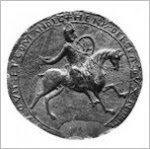• The Heptarchy - The Seven Kingdoms of Anglo-Saxon England
Mercia: Home of the Border People
The ancient kingdom of Mercia was centred on the Trent river valley and its tributaries in the region now known as the Midlands. The name is a Latin translation of the Old English Mierce or Merce, meaning "border people" or "boundary folk".
Although Mercia's beginnings are obscure archaeological surveys have shown that Angles had settled the lands north of the River Thames by the sixth century. The earliest known king of Mercia was Creoda who is said to have been the great grandson of Icel. He came to power around 584AD and built a fortress at Tamworth which became the seat of the Mercian kings.
It was pagan Mercian king Penda, 626/633-655AD, who freely allowed Christian missionaries from Lindisfarne into Mercia. After a reign of successful battles against all his opponents, Penda was defeated and killed at the Battle of Winwaed by the Northumbrian king Oswiu in 655AD. This battle led to a temporary collapse of Mercian power. After the murder of Penda's son Peada, Oswiu assumed control of the whole of Mercia. Another son of Penda, Wulfhere, 658-675AD, successfully restored the power of Mercia, and he ruled until 675AD, but the end of his reign saw defeat against Northumbria.
The next important king of Mercia was Aethelbald 716-757AD who, because of his prowess as a military leader, acquired the title of Bretwalda. At the beginning of his reign he had to face two strong rival kings, Wihtred of Kent and Ine of Wessex. But when Wihtred died in 725AD and Ine abdicated his throne the next year to become a monk in Rome, Aethelbald was free to establish Mercia's supremacy over the rest of the Anglo-Saxons south of the Humber. After Aethelbald was murdered by one of his bodyguards in 757AD a civil war followed which came to an end with the victory of Offa who went on became the one of the greatest kings of Mercia. He won battles and dominated southern England, and took an active part in administering the affairs of his kingdom. He founded market towns and oversaw the first major issues of gold coins in Britain. He also assumed a role in the administration of the church in England and sponsored the archbishopric of Lichfield. Offa is also credited with the construction of Offa's Dyke which marked the border between Wales and Mercia. Offa died in 796AD.
In 868AD Viking invaders from Denmark occupied Nottingham. The last king of Mercia, Burgred, was ousted from his kingdom by Vikings in 874AD. In 886AD, the eastern part of the kingdom became part of the Danelaw and Mercia was reduced to its western portion only. The Danes appointed a Mercian thegn, Ceolwulf II, as king and the remaining independent part of Mercia was ruled by Earl Aethelred of Mercia 883-911AD.
Aethelred married Aethelflaed, the daughter of Alfred the Great of Wessex, and she gradually assumed power as Aethelred became increasingly ill. His illness may have been caused by wounds inflicted in battle against the Vikings at Tettenhall, where the last large Viking army to ravage England suffered defeat by the combined armies of Mercia and Wessex. In 911AD after Aethelred’s death, Aethelflaed gave Oxford and London together with the lands belonging both, to her brother Edward the Elder of Wessex as a token of loyalty. She then fortified Mercia's existing borders and in 917AD expelled the Danes from Derby, ruling alone as ‘Lady of the Mercians’ until her death in 918AD.
The Anglo-Saxon Chronicle details the end of Mercian independence following the death of Aethelflaed. Edward of Wessex took over the fortress at Tamworth and accepted the submission of all those who were settled in Mercia, both Danish and English. In 919AD Aelfwynn, Aethelred's daughter, was deprived of any authority in Mercia and was taken to Wessex. However references to Mercia continue in the annals during the reigns of Aethelstan and his successors. In 975AD King Edgar is described as 'friend of the West Saxons and protector of the Mercians'. A separate political existence from Wessex was restored in 1016, when the kingdom was divided between Cnut and Edmund Ironside, with Cnut taking Mercia. In 1017 Cnut awarded the governance of Mercia to Eadric Streona. Later earls such as Leofric, Aelfgar and Edwin, ruled over a territory that roughly corresponded to historical Mercia, and the Mercians as a peoples are last mentioned in the annal of 1049.
Gloucester:
Gloucester is in the region of England known as the west counties and lies close to the Welsh border on the eastern bank of the River Severn. It is located approximately 32 miles northeast of Bristol and is sheltered by the Cotswolds to the east. The Forest of Dean and the Malvern Hills lie to the west and north west respectively.
Gloucester was founded in 48AD by the Romans as Glevum ie. the Roman municipality of Colonia Nervia Glevensium or Glevum. Parts of the walls can be traced and many coins have been found, although inscriptions are rare. It is mentioned in the Historia Brittonum that Vortigern's grandfather ruled Gloucester and, according to the Anglo-Saxon Chronicle, Gloucester passed to the kingdom of Wessex after the Battle of Deorham in 577AD, until around 584AD when it came under the control of Mercia.
In 681AD Aethelred founded the abbey of St Peter and this combined with Gloucester's situation on a navigable river encouraged the growth of the town. Prior to the Norman Conquest of England Gloucester was a borough governed by a port reeve.
The first Earl of Gloucester, Godwin, was succeeded nearly a century later by Robert of Gloucester, an illegitimate son of King Henry I and a Welsh noblewomen. King Henry II granted the town its first charter in 1155. This gave the burgesses the same liberties as the citizens of London and Winchester, while the second charter of Henry II gave them freedom of passage on the River Severn. The first charter was confirmed by Richard I in 1194 and the privileges of the borough were greatly extended by the charter of King John in 1200. In 1483 Gloucester was made a county by King Richard III, and this charter was confirmed in 1489 and 1510. Gloucester also received charters of incorporation from Queen Elizabeth I and King James I.
• More about Mercia:
• Explore History of Mercia
• Discover Historic Gloucester
• Read Mercia: an Anglo-Saxon Kingdom in Europe by Michelle P. Brown and Carol Ann Farr
Subscribe to:
Post Comments (Atom)








No comments:
Post a Comment